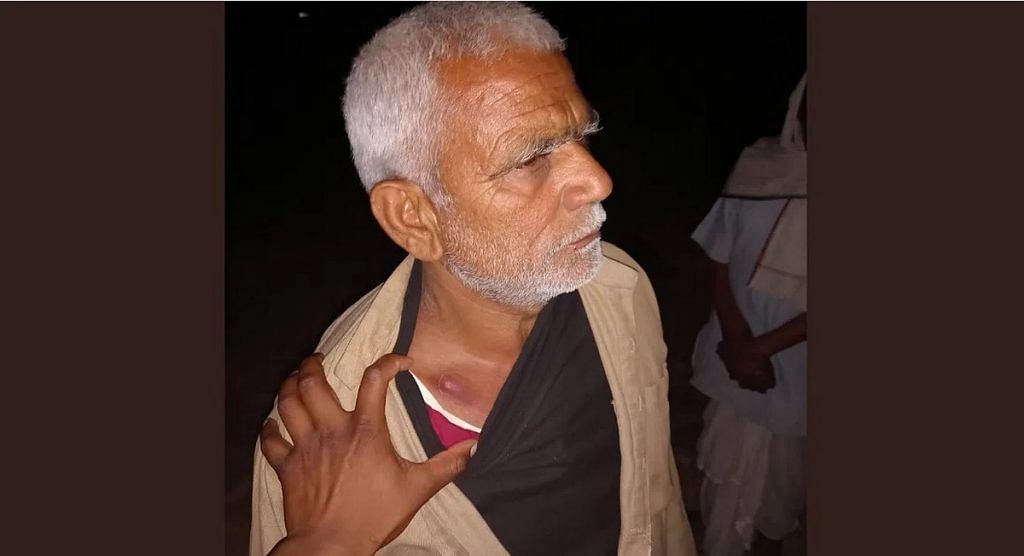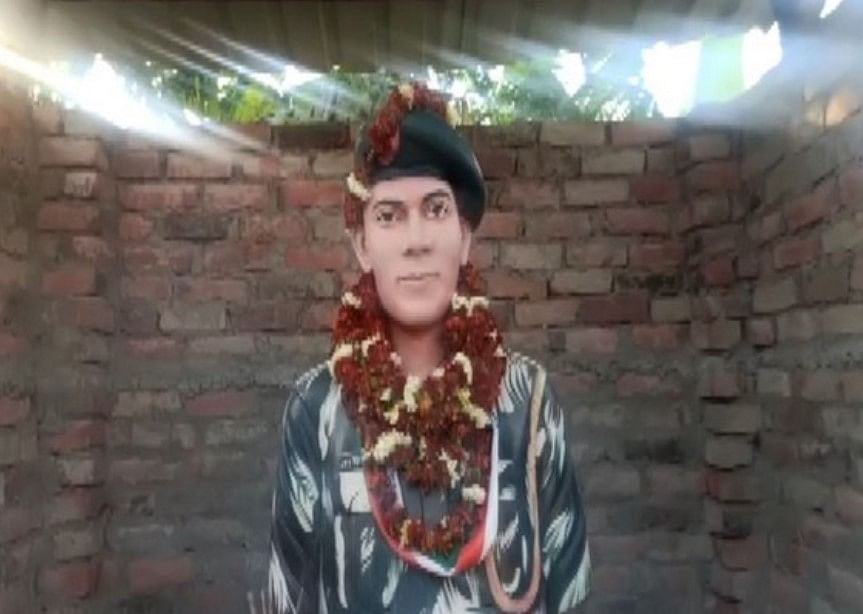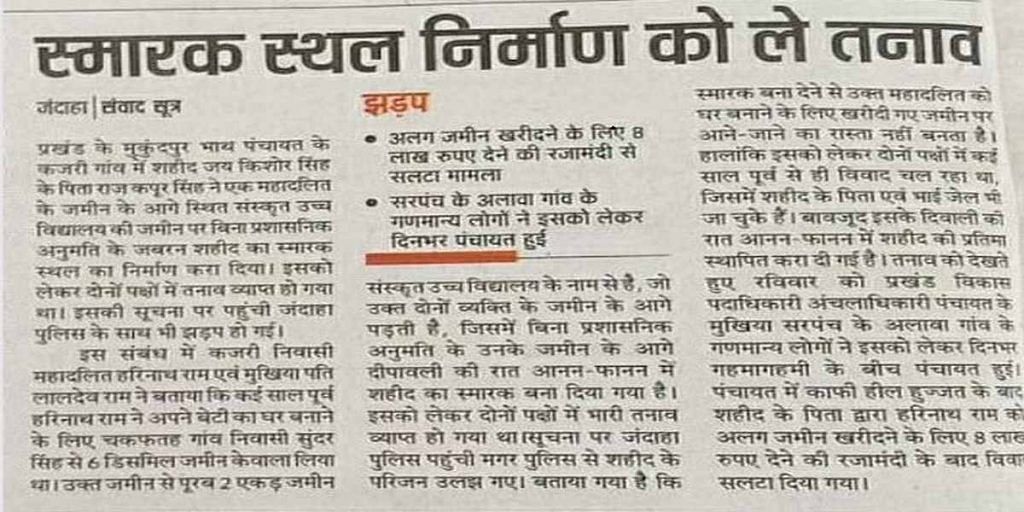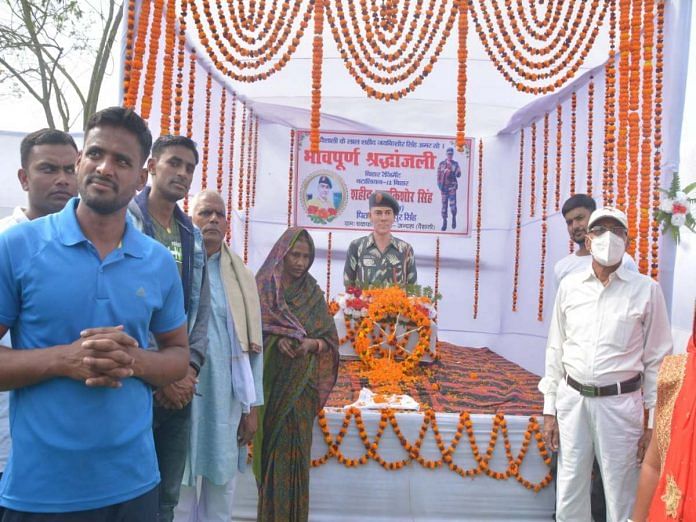New Delhi: When a video went viral of policemen allegedly manhandling and arresting a fallen soldier’s father for ‘illegally’ building a memorial to his son in Bihar’s Vaishali district, it ignited both public and political outrage. So much so that even Defence Minister Rajnath Singh reportedly conveyed his displeasure to Bihar Chief Minister Nitish Kumar. However, a history of caste conflict and personal enmity also lies behind the emotive issue, ThePrint has learnt.
The controversy burst into public view late last month after CCTV footage emerged of policemen purportedly hauling away Rajkapoor Singh, the father of the late Army jawan Jai Kishore Singh, who lost his life at the age of 22 in the June 2020 Galwan Valley clash between Indian and Chinese troops.
The arrest from Vaishali’s Chak Fatah village— which comes under Jandaha police station — on 25 February came on the back of a complaint by Harinath Ram, a resident of a nearby village.
Harinath claimed in a 23 February FIR, which ThePrint has seen, that a memorial to Jai Kishore that Rajkapoor had built on government land also encroached on property that belonged to him and that he had been mistreated by the soldier’s family in the course of the dispute.
The police subsequently booked Rajkapoor under sections 188 (disobedience causing danger to human life), 323 (causing hurt voluntarily), 504 (causing public disturbance) and 506 (criminal intimidation) of the Indian Penal Code (IPC).
Provisions of the Scheduled Caste and Scheduled Tribe (Prevention of Atrocities) Act were also invoked. Rajkapoor Singh belongs to the Rajput community and Harinath Ram is a Dalit.
With Rajkapoor’s family alleging that the Jandaha police had “manhandled” him and “threatened” to break a bust of Jai Kishore at the disputed site, the matter quickly escalated into a major political controversy.
On 1 March, BJP MLAs staged a walkout in the Bihar assembly over the police’s alleged “disrespect” towards the family of a hero. Defence Minister Rajnath Singh also reportedly spoke to Bihar CM Nitish Kumar, who in turn told the assembly that an investigation would be carried out.

The Bihar director general of police (DGP) has now constituted a team to probe the matter. In a statement, the Bihar Police have also said that “action will be taken” against any police officer found to be guilty of misconduct. Rajkapoor was granted bail on 3 March.
Amid the uproar, the police in Vaishali denied allegations of misconduct. Addressing mediapersons, Mahua sub-divisional police officer (SDPO) Punam Keshari has said that the soldier’s memorial blocked access to Harinath’s land.
“They built a memorial, then overnight walls came up around it. There was encroachment on government land. He was told repeatedly to remove the encroachment,” she has been reported as saying.
However, the matter seems to have older roots, dating to even before soldier Jai Kishore’s death.
When ThePrint spoke to Jai Kishore’s family, Harinath Ram, and local police personnel, a picture emerged of old grudges and simmering caste tensions between the Dalit and Rajput communities of the area.
Also read: From ‘jamaat’ to ‘jaat’ — how Nitish is using the caste census in Bihar to corner the BJP
Old dispute, caste tensions
The bad blood between the soldier’s family and Harinath Ram dates to well before the jawan’s death. Earlier too, the dispute was centred around Ram’s land near the Singhs’ family home in Chakh Fatah.
In 2019, the matter grew so contentious that Harinath lodged a case with the police, leading to Rajkapoor Singh and one of his sons, Kaushal, being jailed under the SC/ST Act for about five months.
When asked about this, another son, Nand Kishore, acknowledged that there had been a dispute but said his family did not deserve to be “punished” for it indefinitely.
“My father has already served his sentence. It has been almost five years since that. It seems that we are still being punished for old mistakes,” he said.
His brother, Naval Kishore Singh, added: “The incident that happened in 2019 was not a big one. Both sides were at fault, but our family was booked under the SC/ST Act, due to which my father and brother Kaushal had to stay in jail for several months.”

According to him, “no matter what happens, the SC/ST Act is slapped on us”, including in the dispute around the memorial.
Harinath Ram, however, said that the Rajput family’s sense of victimisation was misplaced. “We come from Dalit society. We are harassed again and again. We have been thrashed many times,” he said.
According to the 2011 Census, Chakh Fatah village is home to only 1,020 people, with the Scheduled Caste community comprising 31 per cent of the population.
Flare-up over memorial, ‘broken promises’
The land feud flared up again soon after the death of Jai Kishore Singh, when his family decided that they wanted to build the memorial near their house. While a statue was to be erected on government land, the proposed boundary wall would block Harinath’s access to his adjacent plot.
“Jai Kishore’s family is doing this just to harass me. They could have got Bihar government land at many places nearby, but they just wanted to build it in a place that closes my access completely,” Harinath claimed.
Referencing the 2019 incident, he further alleged: “They always wanted to usurp my land. In the earlier dispute over the land, my family and I were assaulted, too, and they went to jail for it.”
Nand Kishore Singh, however, denied that there was any malafide reason for building the memorial at the site.
“We wanted to have the memorial in front of our house and all the people living here also supported this. The government gave us permission for this,” he claimed.
With the Rams and Singhs butting heads for several months on this matter, a panchayat meeting was called in November 2020 to help resolve the conflict. This meeting, said both Nand Kishore and Harinath, was held in the presence of the block development officer (BDO) and the CEO of Jandaha block.
The purported agreement reached at the panchayat was that the Singhs could build their memorial using government land as well as Ram’s property as long as they agreed to compensate him with land worth Rs 8 lakh elsewhere.

From this point on, the versions of the two parties diverge.
Harinath claimed that the agreement was that the land would be bought for him first, and then the memorial would be constructed. Instead, he claimed, no land was given and a wall was built “overnight” around a bust of Jai Kishore in January this year. He said that the Singhs could have built their memorial elsewhere but chose to “harass” him by encroaching on his land.
“The decision taken by the panchayat was acceptable to both the parties. But the matter was that first the land should be bought for me and then the memorial should be constructed there. But overnight those people built a wall around the martyr’s memorial and started getting plaster done,” Harinath told ThePrint.
Nand Kishore Singh, on the other hand, claimed that the family had bought land elsewhere for Harinath as promised, but that he was the one who had reneged on his promise and approached the police.
The dispute seems to have pitted some villagers against Harinath Ram.
Speaking to ThePrint, a villager from the Rajput community said on condition of anonymity that the “entire village” wanted the memorial to be built.
“No one had any objection. A son of the village was martyred in the service of the country… it is a matter of pride for any village,” he said.
Another villager, also from an ‘upper caste’ and asking to not be named, alleged that Harinath had been “brainwashed”, leading him to reject the agreement.
Harinath, however, dismissed such claims.
“I had bought the land to build a house, but building a memorial blocks the entire road. When the panchayat was held, everyone said that I had agreed to give the land, but the promise made by them was not fulfilled and construction was done overnight, on which I objected, I was abused and misbehaved with. That is why I lodged the FIR,” he said.
In this matter too, the issue of caste has come front and centre.
‘Caste bias’ of police?
While Harinath Ram has claimed that he was mistreated during the dispute on account of his caste, the Singhs have alleged that they are the ones bearing the brunt of “bias”.
Jai Kishore’s family have not only claimed that they were “manhandled” by the police, but that the sub-inspector (SI) in charge of Jandaha police station has been “biased” against them since he belongs to the same Dalit community as Harinath Ram.
“The station head is working completely unilaterally. They keep trying to harass us and our family. He is looking into the matter in a casteist manner and has threatened us earlier as well,” Naval Kishore alleged.
“The Jandaha police station chief is taking caste revenge. My father was beaten by the police while they were taking him away. After that he misbehaved with him in the police station also,” he claimed.
When asked about these allegations, SI Vishwanath Ram denied all wrongdoing. He also claimed that the Dalit community was being “defamed” since the Rajput family had a “louder voice that reached all the way to Delhi”.
SI Ram said that the memorial was built on the disputed land “overnight and with bad intentions”, leading to a scuffle.
“An attempt had been made to resolve the matter by calling both the parties in the janata darbar (panchayat meeting). But again in January [2023] the construction work started there. When Harinath Ram objected, he was treated indecently, due to which he lodged an FIR,” the SI added. “No excesses were committed. I have a CCTV camera installed in the police station in which everything is captured.”
When asked about the allegations of police brutality, Vaishali’s superintendent of police (SP) Shri Manish said that a high-level team at police headquarters was probing the matter. “Everything will be clear after the investigation,” he said.
On Rajkapoor Singh being arrested under the SC/ST Act in the wake of the land dispute, Manish said that Harinath Ram’s “right of way” had been affected and he had mentioned harassment in his police complaint.
“An FIR was lodged against him for which he was arrested. There was a case of SC/ST Act on him. The SDPO investigated and found the allegation to be true.”
ThePrint tried to contact SDPO Punam Keshari via telephone, but had not received a response by the time this report was published.
(Edited by Asavari Singh)
Also read: Why Nitish is sending team to TN day after Tejashwi trashed reports of ‘attacks’ on Bihar migrants



